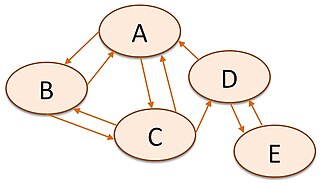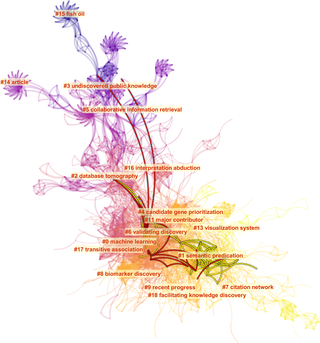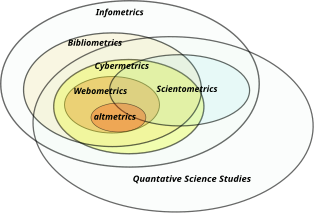
The science of webometrics tries to measure the World Wide Web to get knowledge about the number and types of hyperlinks, structure of the World Wide Web and using patterns. According to Björneborn and Ingwersen, the definition of webometrics is "the study of the quantitative aspects of the construction and use of information resources, structures and technologies on the Web drawing on bibliometric and informetric approaches." The term webometrics was first coined by Almind and Ingwersen (1997). A second definition of webometrics has also been introduced, "the study of web-based content with primarily quantitative methods for social science research goals using techniques that are not specific to one field of study", which emphasizes the development of applied methods for use in the wider social sciences. The purpose of this alternative definition was to help publicize appropriate methods outside the information-science discipline rather than to replace the original definition within information science.

Bibliometrics is the application of statistical methods to the study of bibliographic data, especially in scientific and library and information science contexts, and is closely associated with scientometrics to the point that both fields largely overlap.

Derek John de Solla Price was a British physicist, historian of science, and information scientist. He was known for his investigation of the Antikythera mechanism, an ancient Greek planetary computer, and for quantitative studies on scientific publications, which led to his being described as the "Herald of scientometrics".
Scientometrics is a subfield of informetrics that studies quantitative aspects of scholarly literature. Major research issues include the measurement of the impact of research papers and academic journals, the understanding of scientific citations, and the use of such measurements in policy and management contexts. In practice there is a significant overlap between scientometrics and other scientific fields such as information systems, information science, science of science policy, sociology of science, and metascience. Critics have argued that overreliance on scientometrics has created a system of perverse incentives, producing a publish or perish environment that leads to low-quality research.
Citation analysis is the examination of the frequency, patterns, and graphs of citations in documents. It uses the directed graph of citations — links from one document to another document — to reveal properties of the documents. A typical aim would be to identify the most important documents in a collection. A classic example is that of the citations between academic articles and books. For another example, judges of law support their judgements by referring back to judgements made in earlier cases. An additional example is provided by patents which contain prior art, citation of earlier patents relevant to the current claim. The digitization of patent data and increasing computing power have led to a community of practice that uses these citation data to measure innovation attributes, trace knowledge flows, and map innovation networks.

Eugene Eli Garfield was an American linguist and businessman, one of the founders of bibliometrics and scientometrics. He helped to create Current Contents, Science Citation Index (SCI), Journal Citation Reports, and Index Chemicus, among others, and founded the magazine The Scientist.

Informetrics is the study of quantitative aspects of information, it is an extension and evolution of traditional bibliometrics and scientometrics. Informetrics uses bibliometrics and scientometrics methods to study mainly the problems of literature information management and evaluation of science and technology. Informetrics is an independent discipline that uses quantitative methods from mathematics and statistics to study the process, phenomena, and law of informetrics. Informetrics has gained more attention as it is a common scientific method for academic evaluation, research hotspots in discipline, and trend analysis.
Howard D. White is a scientist in library and information science with a focus on informetrics and scientometrics.
Bibliographic coupling, like co-citation, is a similarity measure that uses citation analysis to establish a similarity relationship between documents. Bibliographic coupling occurs when two works reference a common third work in their bibliographies. It is an indication that a probability exists that the two works treat a related subject matter.
The h-index is an author-level metric that measures both the productivity and citation impact of the publications, initially used for an individual scientist or scholar. The h-index correlates with success indicators such as winning the Nobel Prize, being accepted for research fellowships and holding positions at top universities. The index is based on the set of the scientist's most cited papers and the number of citations that they have received in other publications. The index has more recently been applied to the productivity and impact of a scholarly journal as well as a group of scientists, such as a department or university or country. The index was suggested in 2005 by Jorge E. Hirsch, a physicist at UC San Diego, as a tool for determining theoretical physicists' relative quality and is sometimes called the Hirsch index or Hirsch number.

Louis André (Loet) Leydesdorff was a Dutch sociologist, cyberneticist, communication scientist and Professor in the Dynamics of Scientific Communication and Technological Innovation at the University of Amsterdam. He is known for his work in the sociology of communication and innovation, especially for his Triple helix model of innovation developed with Henry Etzkowitz in the 1990s.
The International Society for Scientometrics and Informetrics was founded in 1993 in Berlin at the International Conference on Bibliometrics, Informetrics and Scientometrics. It is an association for professionals in the field of scientometrics.
A bibliometrician is a researcher or a specialist in bibliometrics. It is near-synonymous with an informetrican, a scientometrican and a webometrician, who study webometrics.

A citation graph, in information science and bibliometrics, is a directed graph that describes the citations within a collection of documents.
Author-level metrics are citation metrics that measure the bibliometric impact of individual authors, researchers, academics, and scholars. Many metrics have been developed that take into account varying numbers of factors.
There are a number of approaches to ranking academic publishing groups and publishers. Rankings rely on subjective impressions by the scholarly community, on analyses of prize winners of scientific associations, discipline, a publisher's reputation, and its impact factor.
Wolfgang Joachim Emil Glänzel is a German statistician who is a full professor at KU Leuven, where he is also the director of the Centre for R&D Monitoring. In 1999, he and Henk Moed received the Derek de Solla Price Memorial Medal from the International Society for Scientometrics and Informetrics (ISSI). Currently, he is the editor-in-chief of Scientometrics, as well as secretary-treasurer of the ISSI. In that role, he took the controversial decision to withdraw an article under pressure by a commercial publisher criticized in that paper and partly owned by the publisher of his journal.
Judit Bar-Ilan was an Israeli computer scientist known for her research in informetrics and scientometrics. She was a professor of information science, and head of the Department of Information Science at Bar-Ilan University.
The Derek de Solla Price Memorial Award, or Price Medal, was conceived to honor Derek J. de Solla Price for his contributions to information science and for his crucial role in developing the field of scientometrics. The award was launched by Tibor Braun, founder of the international journal Scientometrics, and is periodically awarded by the journal to scientists with outstanding contributions to the fields of quantitative studies of science. The awarding ceremony is part of the annual ISSI conference. The first medal was awarded to Eugene Garfield in 1984. The full list of winners can be found below.
The Leiden Manifesto for research metrics (LM) is a list of "ten principles to guide research evaluation", published as a comment in Volume 520, Issue 7548 of Nature, on 22 April 2015. It was formulated by public policy professor Diana Hicks, scientometrics professor Paul Wouters, and their colleagues at the 19th International Conference on Science and Technology Indicators, held between 3–5 September 2014 in Leiden, The Netherlands.







